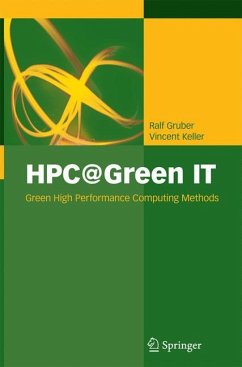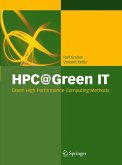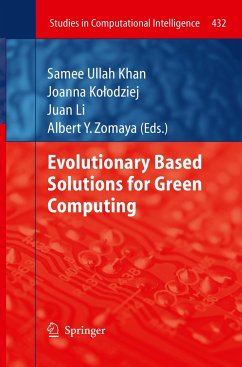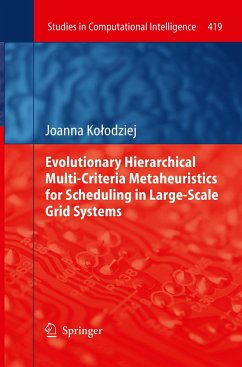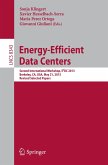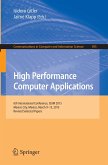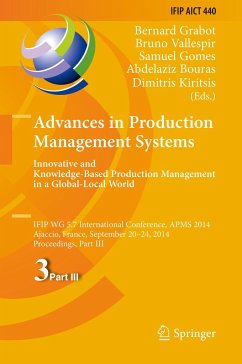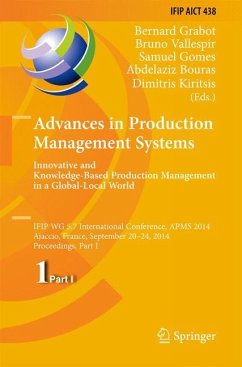Making the most ef?cient use of computer systems has rapidly become a leading topic of interest for the computer industry and its customers alike. However, the focus of these discussions is often on single, isolated, and speci?c architectural and technological improvements for power reduction and conservation, while ignoring the fact that power ef?ciency as a ratio of performance to power consumption is equally in?uenced by performance improvements and architectural power red- tion. Furthermore, ef?ciency can be in?uenced on all levels of today's system hi- archies from single cores all the way to distributed Grid environments. To improve execution and power ef?ciency requires progress in such diverse ?elds as program optimization, optimization of program scheduling, and power reduction of idling system components for all levels of the system hierarchy. Improving computer system ef?ciency requires improving system performance and reducing system power consumption. To research andreach reasonable conc- sions about system performance we need to not only understand the architectures of our computer systems and the available array of code transformations for p- formance optimizations, but we also need to be able to express this understanding in performance models good enough to guide decisions about code optimizations for speci?c systems. This understanding is necessary on all levels of the system hierarchy from single cores to nodes to full high performance computing (HPC) systems, and eventually to Grid environments with multiple systems and resources.
From the reviews:
"The current book "HPC@Green IT" by Ralf Gruber and Vincent Keller is unique in addressing all of these topics in a coherent and systematic way and in doing so fills an important gap. The methods presented and their integration have the potential to influence power efficiency and consumption on various scales of the system architectures and should ultimately help the 'greening' of HPC computing. "
Dr. Erich Strohmaier, Lawrence Berkeley Laboratory, August 2009
"The book familiarizes readers with this topic and provides a collection of techniques for green high-performance computing (HPC). ... In summary, this well-written book includes a lot of colorful graphs/charts, tables, and benchmark results. ... Whereas the authors mainly discuss techniques like frequency scaling (to reduce power usage) and compiler optimization (to reduce execution time), there are other techniques that can improve a system's efficiency--for example, dynamic powering on/off servers." (Michele Mazzucco, ACM Computing Reviews, August, 2010)
"The current book "HPC@Green IT" by Ralf Gruber and Vincent Keller is unique in addressing all of these topics in a coherent and systematic way and in doing so fills an important gap. The methods presented and their integration have the potential to influence power efficiency and consumption on various scales of the system architectures and should ultimately help the 'greening' of HPC computing. "
Dr. Erich Strohmaier, Lawrence Berkeley Laboratory, August 2009
"The book familiarizes readers with this topic and provides a collection of techniques for green high-performance computing (HPC). ... In summary, this well-written book includes a lot of colorful graphs/charts, tables, and benchmark results. ... Whereas the authors mainly discuss techniques like frequency scaling (to reduce power usage) and compiler optimization (to reduce execution time), there are other techniques that can improve a system's efficiency--for example, dynamic powering on/off servers." (Michele Mazzucco, ACM Computing Reviews, August, 2010)
Aus den Rezensionen:
"... wird die Relevanz dieses Buchs schnell klar. Dieses systematische Buch setzt sich dafür ein, dass so wohl Rechenleistung als auch Stromverbrauch bei Hochleistungsrechnern realistisch ... ist das Buch eine Inspirationsquelle für alle, die sich mit der Verbrauchssenkung bei schnellen Rechnern befassen."
(in: Bulletin electrosuisse, 2/July/2010, Issue 7, S. 121)
"... wird die Relevanz dieses Buchs schnell klar. Dieses systematische Buch setzt sich dafür ein, dass so wohl Rechenleistung als auch Stromverbrauch bei Hochleistungsrechnern realistisch ... ist das Buch eine Inspirationsquelle für alle, die sich mit der Verbrauchssenkung bei schnellen Rechnern befassen."
(in: Bulletin electrosuisse, 2/July/2010, Issue 7, S. 121)

